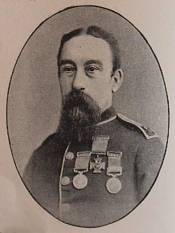William Jones (VC)
| William Jones | |
|---|---|
 |
|
| Born | 1839 Evesham, Worcestershire |
| Died | 15 April 1913 (aged 73–74) Manchester |
| Buried at | Philip's Park Cemetery, Manchester (53°29′20.5″N 2°11′59″W / 53.489028°N 2.19972°W) |
| Allegiance |
|
| Service/branch |
|
| Rank | Private |
| Commands held | 24th Regiment of Foot |
| Battles/wars | |
| Awards | Victoria Cross |
William Jones VC (1839 – 15 April 1913) was a British recipient of the Victoria Cross for his action at the Battle of Rorke's Drift in January 1879, the highest and most prestigious award for gallantry in the face of the enemy that can be awarded to British and Commonwealth forces.
Jones was born and previously lived in Evesham, Worcestershire. He was approximately 39 years old, and a private in the 2nd Battalion, 24th Regiment of Foot (later The South Wales Borderers), British Army during the Zulu War when the following deed took place for which he was awarded the VC. On 23 January 1879 at Rorke's Drift, Natal, South Africa, Private 593 William Jones and Private 716 (Robert Jones) defended one of the wards in the field hospital to the last, until six out of the seven patients had been removed. The seventh was delirious and although they managed to dress him, they could not induce him to move and when they returned to carry him away he was being stabbed to death in his bed.
Jones had a joint citation with Robert Jones VC that read:
In another ward, facing the hill, Private William Jones and Private Robert Jones defended the post to the last, until six out of the seven patients it contained had been removed. The seventh, Sergeant Maxfield, 2nd Battalion 24th Regiment, was delirious from fever. Although they had previously dressed him, they were unable to induce him to move. When Private Robert Jones returned to endeavour to carry him away, he found him being stabbed by the Zulus as he lay on his bed.
Jones was being treated at Netley Hospital for chronic rheumatism, which he claimed to have contracted from the cold and wet nights after Rorke's Drift; before being discharged on 2 January 1880 and on 13 January 1880, he received his award from Queen Victoria at Windsor Castle. Upon leaving the Army, he attempted to establish himself in Birmingham. Employment opportunities were few, but he managed to take part in a number of acting parts, including Hamilton's Pansterorama and in 1887 he eventually became a member of Buffalo Bill's Wild West Show
...
Wikipedia
